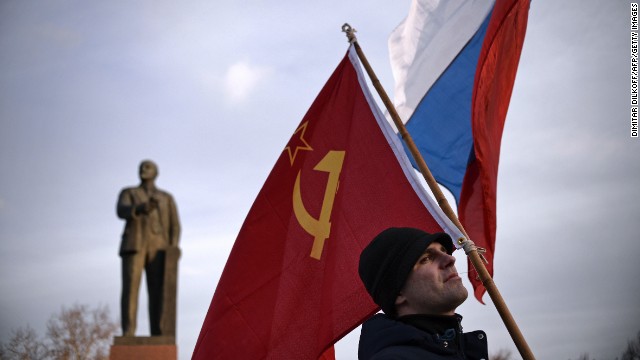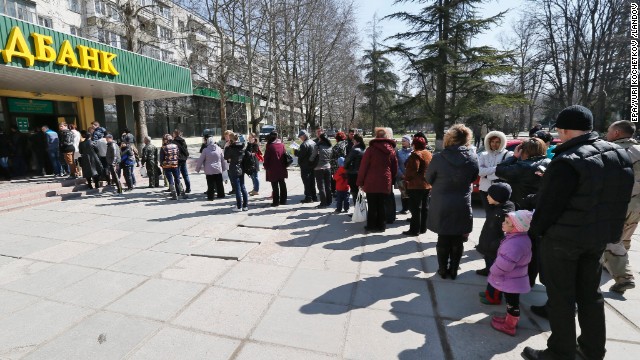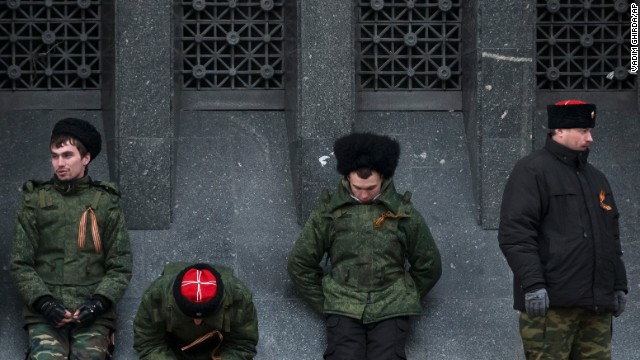Quavering East Europe
"I wouldn't be afraid of Russian aggression in a short term. I'm 100 percent sure (that NATO would help its eastern allies). I think that NATO gets stronger as a result of the conflict in Ukraine."
Michal Qur'an, Institute of International Relations, Prague
"We are afraid the conflict in Ukraine could reach us in Moldova. Russian troops could take over Moldova in a day."
Victor Cotruta, Chisinau
"There is first of all fear ... that there could be a possible contagion. Romania is extremely preoccupied."
Romanian Foreign Minister Titus Corlatean
"Anyone who believes that peace and stabilization can be bought through concessions is mistaken. Europe has made such mistakes, and they always led to a catastrophe."
Polish Prime Minister Donald Tusk
"I'm a bit skeptical [believing the West would come to her nation's rescue]. I'd like to believe so but I can't say I trust them 100 percent."
Tiina Seeman, Tallinn, Estonia
 A Crimean man holds a Soviet Union flag in Lenin Square in Simferopol, Ukraine, on March 16.
A Crimean man holds a Soviet Union flag in Lenin Square in Simferopol, Ukraine, on March 16.In the face of Russian hegemonic transgressions in Ukraine, countries across Eastern Europe have become exceedingly nervous. Ordinary people and their leaders harbour a sense of fear. The constraints that always seemed to be able to bar Moscow from its traditional overbearing intimidation appear now to have been watered down to the extent that the Kremlin no longer fears intervention by the United States.
With the dissolution of the Soviet Union, Western Europe had obviously felt the Russian bear was no longer interested in snarling its superiority and exceptionalism leading to its entitlement to play the heavy in Europe. Trust was invested in a new Russia and a new social-political environment. The new Russia was one Europe trustfully was reliant upon for its energy needs. Despite a few troubling scenarios during winters past.
 People stand in
line to vote at a bank office in Simferopol, Ukraine. Results are
expected on Monday. The United States has already said it expects the
Black Sea peninsula's majority ethnic Russian population to vote in
favor of joining Russia. When Russia marched on Georgia to assert independence for South Ossetia and Bessarabia and President Obama meekly assented to Vladimir Putin's outraged demands that the U.S. pull back from its plans to install missile defence bases in Poland the Czech Republic, Moscow had all the assurances it required that it could pursue its plans to reconsolidate in essence what had been lost with the USSR fell under the weight of its own incompetence.
People stand in
line to vote at a bank office in Simferopol, Ukraine. Results are
expected on Monday. The United States has already said it expects the
Black Sea peninsula's majority ethnic Russian population to vote in
favor of joining Russia. When Russia marched on Georgia to assert independence for South Ossetia and Bessarabia and President Obama meekly assented to Vladimir Putin's outraged demands that the U.S. pull back from its plans to install missile defence bases in Poland the Czech Republic, Moscow had all the assurances it required that it could pursue its plans to reconsolidate in essence what had been lost with the USSR fell under the weight of its own incompetence.What followed was the acquiescence of the United States to measuring up to Russia's new diplomatic missions in forestalling a Western assault on Syria, and the UN's and NATO's suspicions of Iran's nuclear intentions. By all those measures, it would be clear sailing for a newly emerging, uber-confident Vladimir Putin, who had just finished entertaining the world with an international sports extravaganza.
 Cossacks guard the regional parliament building during the Crimean referendum in Simferopol.
Cossacks guard the regional parliament building during the Crimean referendum in Simferopol. Those living in Eastern Europe know the old Russia and recognize it in the new Russia. And they recall also that sixty years earlier Poland had guarantees from France and Britain for aid from Nazi aggression. Now, believing that NATO would march purposefully to the assistance of eastern member nations should Russia foist itself once again upon them, requires a belief in an occult fantasy of hopefulness.
That is the palpable fear of 'contagion', that Russia, feeling good about its swaggering 'influence' in Crimea and east Ukraine, might cast its covetous eyes further abroad to recapture the glory that it once basked in. Feelings of dread live acutely in the Baltic nations, now NATO members and members of the European Union.
Estonia, Latvia and Lithuania all have sizeable Russian populations. Should Russia stage an provocative 'incident', the fear is that it could lead to Moscow's declaration affirming it is required of the Kremlin to honour its obligation to "protect" that expatriate Russian population, citizens of other countries of East Europe, be damned.
Labels: Conflict, Crimea, East Europe, European Union, Intervention, NATO, Russia, Ukraine

<< Home